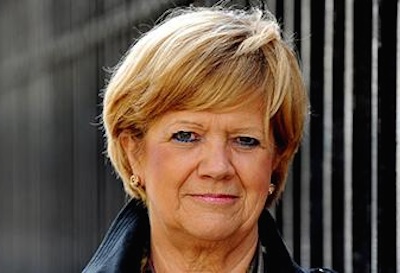
A report by a British judge has found that a long-standing process to deal with the issue of republicans ‘on the run’ from conflict-related prosecutions (OTRs) was lawful.
The report by Court of Appeal judge Heather Hallett rejected unionist allegations that a secret deal had been agreed between the British government and Sinn Fein.
She said that a “flawed” scheme had evolved “under the radar” to allow certain Sinn Fein supporters to receive letters of assurance that they did not face prosecution.
The report was commissioned by British Prime Minister David Cameron amid unionist outrage following the collapse earlier this year of the trial of Donegal man John Downey, who was arrested on suspicion of participating in IRA actions in London. Mr Downey revealed he had received such a letter, prompting a judge to dismiss the case as an abuse of process. The British police later insisted the letter had been issued to Mr Downey by mistake, and that he was still wanted by them.
Of the 187 letters issued to confirm that the recipients did not face prosecution, Hallett said her review had found only two other cases where ‘errors’ were made.
The legal value of the letters still remains uncertain, but the Downey case has set a precedent which will be difficult to overturn.
Sinn Fein’s Gerry Kelly said the Hallett report proved that claims that amnesties were given to IRA Volunteers was “a unionist myth”. He said it was now time to address issues left outstanding from the peace process.
“Lady Hallett said that this scheme was lawful, it was done through the process of the British Attorney General and Public Prosecution Service.
“Far from it being secret, she also notes that Sinn Fein, on a continuous basis, had pushed for a public manifestation of dealing with OTRs and it was raised on a continual basis.”
He rejected claims that some OTRs could now face arrest, and said there could be no question of rescinding the letters.
“There was a commitment given,” he said. “The John Downey case, the veracity or the strength of the letter, albeit that they said it was a mistake, was tested in court.”
He said it was never intended to constitute an amnesty, and said Sinn Fein had never sought one.
“The myth of amnesty is a unionist myth, it has never been uttered by anybody from the republican or nationalist background. We never asked for an amnesty.”
There was no secrecy over the matter, he said, pointing to over 30 pages of public domain material relating to the handling of OTRs which was included in the report. This included accounts in the media, questions and answers in both the Dublin and London parliaments, as well as minutes of Policing Board meetings.
The report also notes discussions in the press around OTRs and royal pardons, noting that DUP leader Ian Paisley “appeared to demonstrate his awareness” in the Stormont assembly.
But Ulster Unionist leader Mike Nesbitt said the report confirmed that Sinn Fein were the only Six-County political party who were aware of the details of the scheme and only those connected to Sinn Fein in a position to avail of it.
“That is simply unfair. You cannot avail of a scheme if you are unaware of its existence,” he said.
DUP leader Peter Robinson, who had appeared to threaten to collapse the North’s political institutions over the matter earlier this year, took a more sanguine view this week.
He said British Direct Ruler Theresa Villiers had apologised to him “personally as well as publicly” about the matter. “I am glad the Secretary of State is taking legal advice to ensure no else can use one of these letters as a barrier to prosecution.”
PARDONS
Meanwhile, former justice minister Michael McDowell confirmed a revelation in the report that he secretly appealed for some Provisional IRA members to be granted royal pardons.
Earlier this year, Villiers said that 16 pardons were issued in the North since the 1998 Good Friday Agreement, and claimed that all records of pardons issued in the decade before that have been lost or destroyed.
Documents uncovered in by judge Hallett show McDowell urged his British counterpart that the London government should use the unusual measure during a difficult stage in the peace process.
A virulent reactionary and lifelong opponent of Sinn Fein, McDowell said this week both governments were trying to bring top republicans “in from the cold” in the years following the peace deal. He said there was also informal agreement among authorities in Dublin at the time that certain figures would not be arrested south of the border.
The Dublin government of the day thought royal pardons could be used for a handful of “household names” linked to IRA actions who the British deemed critical to peace efforts, rather than a general scheme, but that “neither the Shinners nor the Brits were very happy with the idea”.
He was told there were legal reasons they couldn’t “and that was the end of that”.
![[Irish Republican News]](https://republican-news.org/graphics/title_gifs/rn.gif)
![[Irish Republican News]](https://republican-news.org/graphics/title_gifs/harp.gif)

